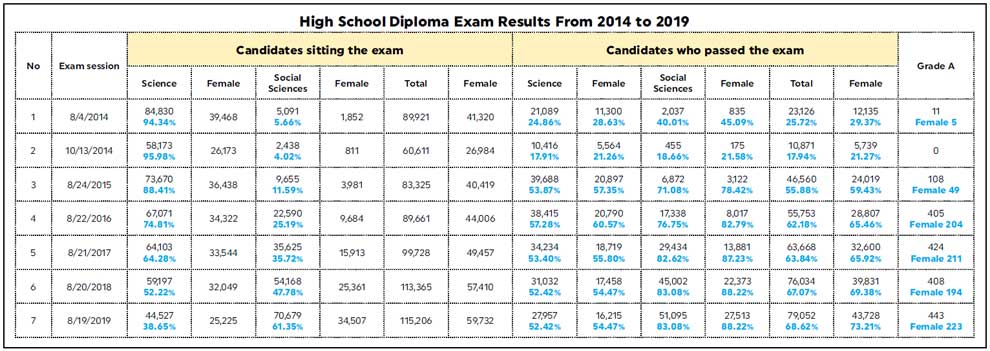
The Rectangular Strategy Phase IV’s top priority is to develop human resources in the Kingdom. Photo supplied
The reform of examinations has garnered parental support and encouraged authorities at all levels to participate in improving the quality of secondary education.
It has also motivated teachers and students to strive even harder – reform of the upper secondary exam has contributed to the increasing number of students passing with Grade A, from 11 in 2014 to 443 last year.
Reform of the upper secondary exam has been among the top priorities of the Ministry of Education, Youth and Sport (MoEYS) since 2014, as based on the Education Strategic Plan 2014-2018 and the Education Strategic Plan 2019-2023 in collaboration with members of the Education Sector Working Group and other stakeholders.
Significant achievements include increasing equitable access to education services at all levels, particularly for the nine years of basic education, as well as growing opportunities for disadvantaged children and youth to enrol at all levels.
The strengthened governance of public educational institutions, improved quality of education through strengthening teachers’ capacities and increasing scholarships for poor students are also notable accomplishments.
Crucial quality improvement measures and responses to education services – particularly reform of the upper secondary exam and other exams – has enabled the Ministry of Education to outline further prioritised reform programmes, such as improving the teaching profession; assessing student achievement; reviewing curricula and core textbooks; and higher education reform.
Young Cambodians have become more active as a result of interventions by all stakeholders, including the Child and Youth Council, Red Cross volunteer youths, and Scouts. MoEYS offers other interventions, including providing both technical and soft skills, job market information, and career counselling and orientation.
Physical education and sport are also key priorities, building on the success of Cambodian sports professionals who have won gold medals at World, Asian and Southeast Asian championships, the Southeast Asian Games and other competitions.
The Rectangular Strategy Phase IV highlights human resource development as its first priority. MoEYS is committed to achieving its first goal of “Improving the Quality of Education, Science and Technology” by focusing on seven reform priorities.
These are made up of:
• Teachers;
• The expansion of schools at all levels;
• Strengthening the comprehensive inspections of school management;
• The promotion of technical education in upper secondary education;
• Skills education in accordance with the labour market;
• The development of comprehensive curricula and textbooks;
• Preparations for the 2023 Southeast Asian Games, which are to be held in the Kingdom.
For the period 2019-2023, and towards 2030 and 2050, the Ministry of Education is committed to achieving Sustainable Development Goal 4 on Education, based on the principles of inclusive, equitable and quality education and promoting lifelong learning opportunities for all.
MoEYS continues to minimise skills gaps by collaborating with relevant stakeholders to intensify the supply of skills training in priority areas, and by introducing digital education in response to policy and the direction of Cambodia’s digital economy.Continuing the work of upper secondary exam reform, MoEYS has set December 21-22 as the date for this year’s paper.
To maintain the quality of the upper secondary exam, the same rules and regulations are to be implemented as in previous years. Additionally, Covid-19 measures will be in place.
While some provinces have faced disruption due to the recent flooding, the 210 exam centres (4,886 exam rooms) have not been affected and are ready to welcome the 121,204 exam candidates (63,938 of whom are female).
The Science stream has 70 exam centres (1,650 exam rooms), while the Social Science stream has 140 exam centres (3,236 exam rooms).
The Science stream consists of 40,765 exam candidates (23,636 female), while 80,439 candidates (40,302 female) make up the Social Science stream.
There will be 113,176 exam candidates (59,834 female) from public education institutions, with 8,028 candidates from private education institutions.
For this year’s upper secondary exam, MoEYS continues to work with all relevant stakeholders – the Anti-Corruption Unit, Union of Youth Federations of Cambodia, the Ministry of Interior, the Ministry of Health, Provincial Offices of Education and local authorities, among others – to uphold the quality of the exam.
The parents of candidates also play a vital role in contributing to the success of the exam by ensuring all exam rules and regulations are followed. These existing collaborations enable the Ministry of Education to continue strengthening the exam’s processes and procedures by applying the four exam principles: law, justice, transparency and acceptable results.
Thus, reforming the upper secondary exam remains a continued Ministry of Education success story for all students, teachers, educational staff members and other stakeholders, with MoEYS highly appreciative of all existing cooperation.

Results of upper secondary exams from 2014 to 2019 under the reform of the upper secondary exam by the Ministry of Education, Youth and Sport. Source: MoEYS









